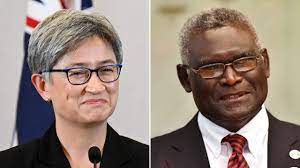Foreign Minister Penny Wong said she had a “constructive” and “wide-ranging” discussion with Solomon Islands Prime Minister Manasseh Sogavare, which included addressing concerns over a recent bilateral security agreement between the Pacific Island nation and China.
“Australia’s view does remain that the Pacific family should remain responsible for our security – and the Pacific family is more than capable of providing that security,” she told reporters in Solomon Islands.
“I welcomed Prime Minister Sogavare’s reassurances that there will not be a military base [run by China] – nor a persistent foreign military presence – here in Solomon Islands.
“I welcome his assurance that Australia remains Solomon’s first security partner of choice, and first development partner of choice.”
The bilateral security deal signed between the Solomon Islands and China is being viewed by some as a potential wedge in the Pacific islands as Beijing moves to expand its influence in the region.
Honiara-based veteran journalist Dorothy Wickham described the visit as “successful” with mix of engagements with politicians and people in the community, including a visit to the King George VI school.
Wickham said bilateral relations need to be strengthened, after they went into decline with the expiry of the 14-year Regional Assistance Mission to Solomon Islands (RAMSI) in 2017.
“When that [RAMSI] closed down, the assistance to Solomon Islands changed and … those relationships sort of faded into the background,” she said.
“There needs to be more listening and taking into consideration what is it that ordinary Solomon Islanders want.
“Solomon Islanders have always asked for better education, better health and trade. So that would be the three areas that Australia can provide assistance.”
During her visit to Solomon Islands, Wong said a deal was finalised for Australia to deliver up to 200,000 COVID-19 vaccine doses for children to Solomon Islands.
The vaccine delivery was requested by Solomon Islands, adding to the 510,000 COVID-19 vaccine doses already provided to the Pacific Island nation.
The additional doses will support the vaccination campaign for children in the Solomon Islands aged between 5 and 11 as schools reopen.
Senator Wong said Australia and Solomon Islands are working together to ensure delivery as soon as possible.
“Australia is standing with Solomon Islands to ensure children can be vaccinated against COVID-19, protecting them and their communities from serious illness and minimising disruption to learning caused by the pandemic,” she said.
The doses come on top of 40 tonnes of medical equipment and supplies which have already been delivered by Australia.
Solomon Islands Health Minister Dr Culwick Togamana said the additional vaccine supply is welcome.
“Though the COVID-19 situation has improved, the reopening of the borders will soon present risks of other variants entering our communities and posing health risks to our children,” he said in a statement.
“Thus, the announcement is timely and rolling out these paediatric COVID-19 vaccines to children aged 5 to 11 years old will be an important undertaking to ensure our children are also protected against COVID-19.”
Wong also spoke about climate change, saying the Labor government would bring “much more ambition” to the issue.
“For Pacific island nations such as Solomon Islands, climate change is real, it is a lived reality,” she said.
“And we want to work with you to ensure greater resilience to that reality, as well as Australia doing the right thing in its own economy.”
“Not only have we committed to net zero by 2050, we have a commitment for 2030 of a 43 per cent reduction that would lead to – in terms of renewable energy – I think 82 per cent of our energy being provided from renewable energy sources.
“We are serious about this.”
China’s proposed regional pact was also raised in discussions during Wong’s visit, which comes ahead of the Pacific Islands Forum in mid-July.
China sent a delegation of officials to visit a series of Pacific Island nations last month to get their support for a region-wide security agreement, but failed to get the signatures it had been seeking.
SOURCE: SBS/PACNEWS













